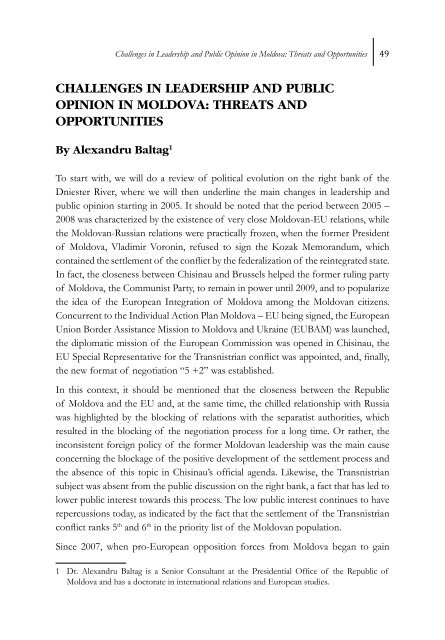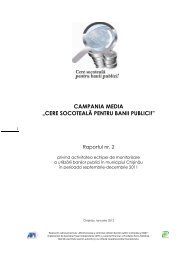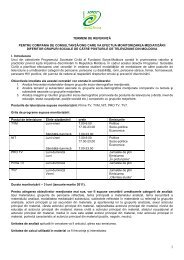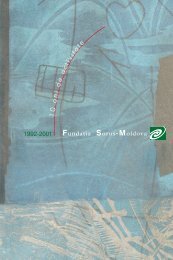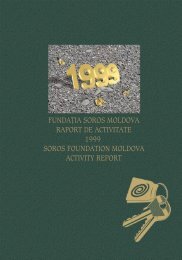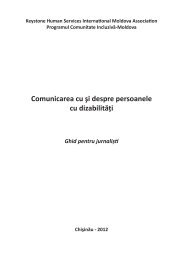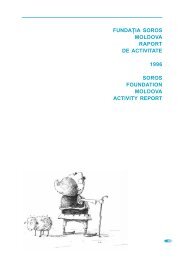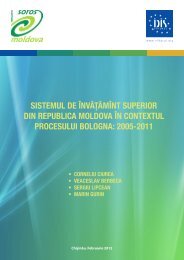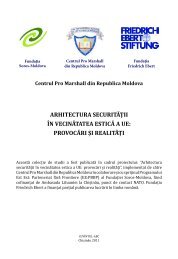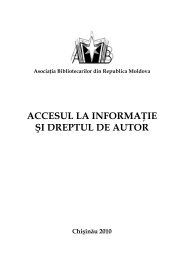Managing Intractable Conflicts: Lessons from Moldova and Cyprus
Managing Intractable Conflicts: Lessons from Moldova and Cyprus
Managing Intractable Conflicts: Lessons from Moldova and Cyprus
Create successful ePaper yourself
Turn your PDF publications into a flip-book with our unique Google optimized e-Paper software.
Challenges in Leadership <strong>and</strong> Public Opinion in <strong>Moldova</strong>: Threats <strong>and</strong> Opportunities<br />
49<br />
CHALLENGES IN LEADERSHIP AND PUBLIC<br />
OPINION IN MOLDOVA: THREATS AND<br />
OPPORTUNITIES<br />
By Alex<strong>and</strong>ru Baltag 1<br />
To start with, we will do a review of political evolution on the right bank of the<br />
Dniester River, where we will then underline the main changes in leadership <strong>and</strong><br />
public opinion starting in 2005. It should be noted that the period between 2005 –<br />
2008 was characterized by the existence of very close <strong>Moldova</strong>n-EU relations, while<br />
the <strong>Moldova</strong>n-Russian relations were practically frozen, when the former President<br />
of <strong>Moldova</strong>, Vladimir Voronin, refused to sign the Kozak Memor<strong>and</strong>um, which<br />
contained the settlement of the conflict by the federalization of the reintegrated state.<br />
In fact, the closeness between Chisinau <strong>and</strong> Brussels helped the former ruling party<br />
of <strong>Moldova</strong>, the Communist Party, to remain in power until 2009, <strong>and</strong> to popularize<br />
the idea of the European Integration of <strong>Moldova</strong> among the <strong>Moldova</strong>n citizens.<br />
Concurrent to the Individual Action Plan <strong>Moldova</strong> – EU being signed, the European<br />
Union Border Assistance Mission to <strong>Moldova</strong> <strong>and</strong> Ukraine (EUBAM) was launched,<br />
the diplomatic mission of the European Commission was opened in Chisinau, the<br />
EU Special Representative for the Transnistrian conflict was appointed, <strong>and</strong>, finally,<br />
the new format of negotiation “5 +2” was established.<br />
In this context, it should be mentioned that the closeness between the Republic<br />
of <strong>Moldova</strong> <strong>and</strong> the EU <strong>and</strong>, at the same time, the chilled relationship with Russia<br />
was highlighted by the blocking of relations with the separatist authorities, which<br />
resulted in the blocking of the negotiation process for a long time. Or rather, the<br />
inconsistent foreign policy of the former <strong>Moldova</strong>n leadership was the main cause<br />
concerning the blockage of the positive development of the settlement process <strong>and</strong><br />
the absence of this topic in Chisinau’s official agenda. Likewise, the Transnistrian<br />
subject was absent <strong>from</strong> the public discussion on the right bank, a fact that has led to<br />
lower public interest towards this process. The low public interest continues to have<br />
repercussions today, as indicated by the fact that the settlement of the Transnistrian<br />
conflict ranks 5 th <strong>and</strong> 6 th in the priority list of the <strong>Moldova</strong>n population.<br />
Since 2007, when pro-European opposition forces <strong>from</strong> <strong>Moldova</strong> began to gain<br />
1 Dr. Alex<strong>and</strong>ru Baltag is a Senior Consultant at the Presidential Office of the Republic of<br />
<strong>Moldova</strong> <strong>and</strong> has a doctorate in international relations <strong>and</strong> European studies.


